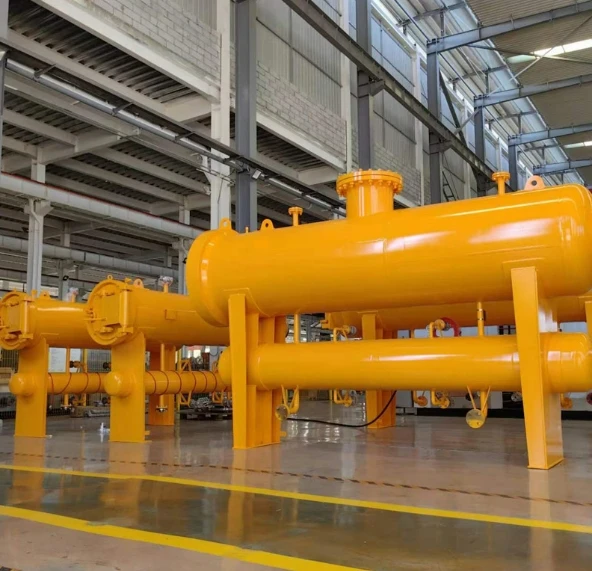
Dec . 05, 2024 14:34
Back to list
filter separator
Understanding Filter Separators A Critical Component in Industrial Processes
In the world of industrial applications, the efficient separation of liquids from solids or different liquid phases is a critical process. Among various separation technologies, filter separators play an essential role, particularly in industries like oil and gas, food processing, and wastewater treatment. This article delves into the significance of filter separators, their working principles, and their applications in various sectors.
What is a Filter Separator?
Filter separators are devices designed to remove particles and separate liquid phases from fluids. They operate on the principle of filtration, combined with gravitational settling, to achieve the desired separation. These devices can effectively handle solid-liquid and liquid-liquid mixtures by utilizing a combination of physical and mechanical processes to provide a high degree of separation efficiency.
Working Principle
The operation of a filter separator can be broken down into several key stages
1. Intake The mixed fluid enters the filter separator through an inlet. This initial stage is crucial as it determines the effectiveness of the subsequent separation process.
2. Filtration As the fluid flows through the separator, it passes through a filter medium. This medium is designed to capture solid particles, including dirt, sediment, and debris. The choice of filter material can vary based on the specific application, with options like woven fabrics, synthetic materials, or even metal screens.
3. Gravity Separation After the solid particles are captured, the remaining liquid moves into a settling chamber, where gravitational forces help separate different liquid phases. For instance, in oil and water separation, the less dense oil will float on top of the water, allowing for easy extraction.
4. Discharge Once the separation is complete, the filtered solids can be removed from the separator, often via a backwashing process. The separated liquid phases are discharged through designated outlets, allowing for further processing or disposal.
Advantages of Filter Separators
The use of filter separators offers several advantages over other separation techniques
filter separator

- Efficiency They provide high separation efficiency, minimizing the amount of undesirable substances left in the filtered output
.- Versatility Filter separators can be designed to handle a wide range of flow rates and accommodate various types of fluids, making them suitable for diverse applications.
- Cost-Effectiveness By reducing the time and resources required for further processing steps, filter separators can lead to significant cost savings in industrial operations.
- Environmentally Friendly They play a crucial role in minimizing waste by ensuring that contaminants are adequately removed before discharge, thereby protecting the environment.
Applications
Filter separators are utilized in several industries, each with its unique requirements
- Oil and Gas In this industry, filter separators are used to separate produced water from hydrocarbons. By efficiently removing solid particles and emulsified water, they help prevent complications in downstream processes and ensure compliance with environmental regulations.
- Food Processing Filter separators are employed to clarify liquids in processes like juice production and dairy processing. They enhance product quality by removing impurities and extending the shelf life of food products.
- Wastewater Treatment In municipal and industrial wastewater treatment facilities, filter separators help in the removal of solids and oils from effluent streams. This not only safeguards public health but also aids in meeting legal discharge limits.
- Pharmaceuticals and Chemicals These industries utilize filter separators for the purification and recovery of valuable products, ensuring that contaminants are thoroughly eliminated from active ingredients.
Conclusion
Filter separators are indispensable tools in numerous industrial sectors, providing efficient and reliable separation solutions. Their ability to enhance product quality, reduce waste, and ensure compliance with environmental norms underscores their importance in modern manufacturing and processing operations. As industries continue to evolve, the design and technology of filter separators are likely to advance, offering even more efficient solutions to meet the growing demands for sustainability and operational efficiency. Understanding the role of these devices is vital for industry professionals aiming to optimize their processes and maintain competitiveness in a rapidly changing market.
Next:
Latest news
-
Safety Valve Spring-Loaded Design Overpressure ProtectionNewsJul.25,2025
-
Precision Voltage Regulator AC5 Accuracy Grade PerformanceNewsJul.25,2025
-
Natural Gas Pressure Regulating Skid Industrial Pipeline ApplicationsNewsJul.25,2025
-
Natural Gas Filter Stainless Steel Mesh Element DesignNewsJul.25,2025
-
Gas Pressure Regulator Valve Direct-Acting Spring-Loaded DesignNewsJul.25,2025
-
Decompression Equipment Multi-Stage Heat Exchange System DesignNewsJul.25,2025

